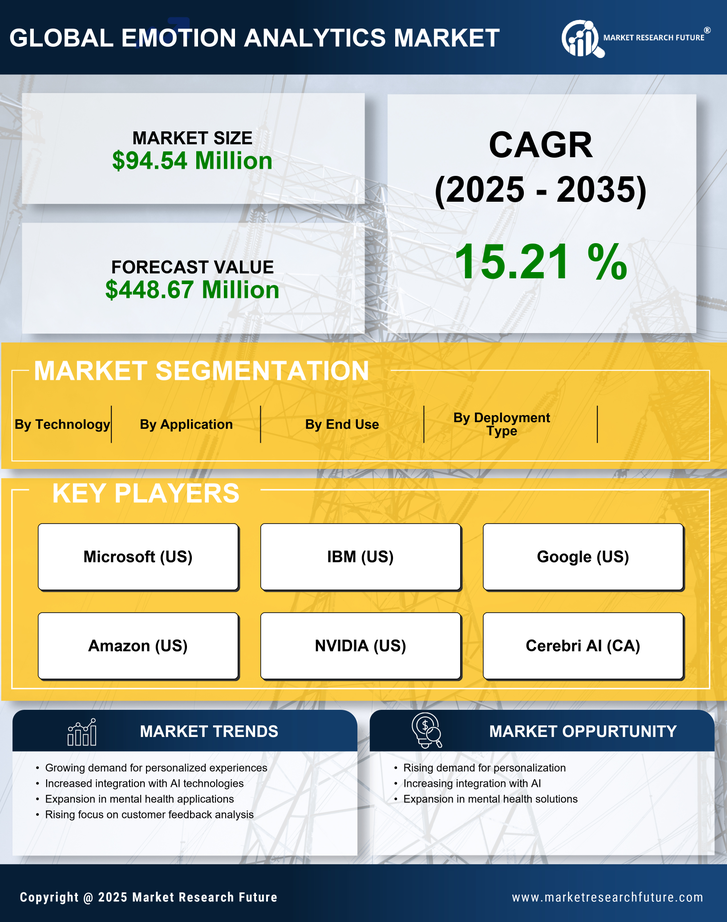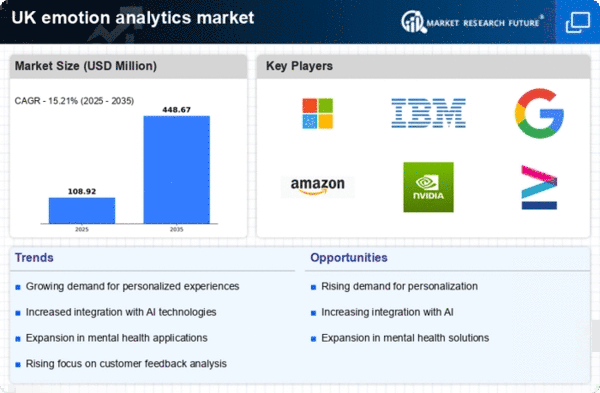Growing Demand for Customer Insights
The emotion analytics market is experiencing a notable surge in demand for customer insights, driven by businesses seeking to enhance customer experience. Companies are increasingly leveraging emotion analytics to understand consumer sentiments and preferences, which can lead to improved product offerings and marketing strategies. In the UK, the market is projected to grow at a CAGR of approximately 25% over the next five years, indicating a robust interest in harnessing emotional data. This trend is particularly evident in sectors such as retail and hospitality, where understanding customer emotions can significantly impact brand loyalty and sales. As organizations strive to create more engaging experiences, the emotion analytics market will play a pivotal role in shaping customer interactions and driving business success..
Integration of Advanced Technologies
The integration of advanced technologies, such as machine learning and natural language processing, is propelling the emotion analytics market forward. These technologies enable more accurate emotion detection and analysis, allowing businesses to gain deeper insights into consumer behavior. In the UK, the adoption of these technologies is expected to increase, with a projected market value reaching £1 billion by 2027. This growth is indicative of the potential for businesses to utilize emotion analytics in real-time decision-making processes. As organizations continue to invest in technology to enhance their analytical capabilities, the emotion analytics market is poised to benefit from this technological evolution, leading to more sophisticated and effective solutions.
Regulatory Support for Data Analytics
Regulatory support for data analytics is emerging as a key driver for the emotion analytics market. The UK government has been promoting the use of data analytics across various sectors, encouraging businesses to adopt innovative solutions that can enhance operational efficiency. This supportive regulatory environment is likely to facilitate the growth of the emotion analytics market, as companies seek to comply with data protection regulations while leveraging emotional data for strategic decision-making. The potential for government incentives and funding for technology adoption further underscores the importance of regulatory support in driving market growth. As businesses navigate the complexities of data analytics, the emotion analytics market stands to benefit from this favorable landscape.
Rising Importance of Employee Engagement
The emotion analytics market is also witnessing a rising importance of employee engagement within organizations. Companies are increasingly recognizing that understanding employee emotions can lead to improved workplace culture and productivity. In the UK, businesses are investing in emotion analytics tools to gauge employee sentiments, which can help in reducing turnover rates and enhancing job satisfaction. This trend is particularly relevant in sectors such as technology and finance, where employee well-being is closely linked to performance. As organizations strive to create a more positive work environment, the emotion analytics market is likely to see increased adoption of tools designed to measure and analyze employee emotions, thereby fostering a more engaged workforce.
Increased Investment in Marketing Strategies
Increased investment in marketing strategies is significantly influencing the emotion analytics market. Companies are recognizing the value of emotional data in crafting targeted marketing campaigns that resonate with consumers. In the UK, businesses are projected to allocate a larger portion of their marketing budgets to emotion analytics tools, with estimates suggesting a rise of up to 30% in spending over the next few years. This shift indicates a growing awareness of the impact that emotional insights can have on consumer engagement and brand loyalty. As organizations strive to differentiate themselves in a competitive market, the emotion analytics market is likely to see heightened demand for solutions that provide actionable emotional insights, ultimately driving marketing effectiveness.

















